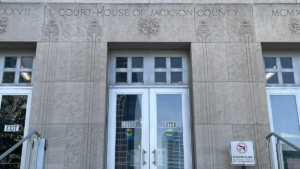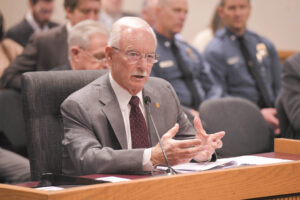5:55
News Story
Five years after Ferguson report, some say progress has come too slow

Police officers in armored vehicles stand guard in front of the Ferguson police department during a demonstration on November 24, 2014 in Ferguson, Missouri. A St. Louis County grand jury decided not indict Ferguson police Officer Darren Wilson in the shooting death of Michael Brown (Photo by Justin Sullivan/Getty Images).
Like so many around the country, Dr. L.J. Punch was glued to the television on the night of Nov. 24, 2014.
That night, the country learned that then-Ferguson police officer Darren Wilson would not be indicted in the Aug. 9 shooting death of 18-year-old Michael Brown Jr.
Punch was a critical-care surgeon working in Houston at the time and trying to care for a two-year-old son.
“I remember the fire,” said Punch, of the unrest that erupted in Ferguson when the grand jury’s decision not to indict was announced. “I saw the sensationalized images from a distance because I was so far away. In a way, it was so detached from my life at the time.”
Within two years, Punch was living in Ferguson and among the most outspoken advocates for implementing reforms laid out in the Ferguson Commission’s report, released five years ago this fall.
The Ferguson Commission was created in reaction to the unrest in Ferguson by then-Missouri Gov. Jay Nixon. Its goal was to conduct a “thorough, wide-ranging and unflinching study of the social and economic conditions that impede progress, equality and safety in the St. Louis region.”
The report it eventually released in 2015 was a culmination of 10 months of meetings, where the commission heard from more than 100 regional leaders, 1,000 community members and 80 subject matter experts.
It outlined 189 calls to action in achieving racial equity in education, jobs, housing and the criminal justice system.
But for all its promise, and all the work that went into producing it, much of its suggestions have seen little progress.
Among those feeling disappointed by the lack of action on the report’s recommendations are Punch, who early this month stepped down as a member of the St. Louis County Board of Police Commissioners after repeatedly hitting roadblocks in moving forward policy changes.
“I think the reason why the Ferguson Commission has not moved St. Louis County is that the county is not interested in increasing equity,” Punch said. “The county is interested in reducing crime. And even though they come to the same conclusion, those inspirations create wildly different structure, policy and culture.”
In response to Punch’s criticism, a county police spokesman said that the department strives to improve by gaining public input on various things, including its updated use-of-force policy and an external review of the department — a study Punch repeatedly challenged.
“I believe we are better than we were five years ago,” said spokesman Sgt. Benjamin Granda, “but not as good as we will be five years from now.”

‘The people’s report’
For many, Nov. 24 is a reminder of the criminal justice movement that ignited after Brown’s death and the calls to action outlined in what was called “the people’s report.”
It’s principles are now at the heart of what people mean when they cry “defund the police,” said Rep. Rasheen Aldridge, D-St. Louis.
“The Ferguson Commission report is saying: how do we reimagine public safety?” Aldridge said. “How do we reinvest back into the people? That’s the same call that individuals like myself and others have been chanting in the streets. It does not mean abolish the police.”
Aldridge was in the streets with other protesters when he heard the news in 2014. Earlier that November, the governor had appointed Aldridge to be part of the 16-member Ferguson Commission.
At 22, he was the youngest member, and he was hesitant to apply because he disapproved of Nixon’s militarized response to the protests.

However, a close friend convinced him to do it.
“Unless somebody is at the table to speak for the people on the street, your ideas that you want to see on the menu won’t be there,” he said.
The commission experience helped inspire Aldridge to run for state representative in November 2019, he said.
George Floyd’s death sparked a renewed energy in the racial justice movement, said David Dwight, executive director of Forward Through Ferguson, which is the organization tasked with advocating for the implementation of the report’s calls to action.
The Ferguson report didn’t just stop at reforming the criminal justice system, Dwight said. It demands investment in early childhood, creating accessible housing, expanding access to healthcare, better job opportunities and pay rates to address the root cause of crime.
“That’s so much of what ‘Defund the police’ is about at its essence,” Dwight said. “How are we reducing the systems that are actually perpetuating inequity and disproportionately hurting people of color.”
The St. Louis region has seen “drops in the bucket” of what the Ferguson report calls for, he said, but they are still considered wins.
Just this year, the group established a $2 million Racial Healing and Justice Fund to invest in healing community trauma and changing the conditions that reinforce systemic racism. The report called for a larger fund, but it’s a start, Dwight said.
The region has also enacted some protections around discrimination in housing and the creation of a housing trust fund in St. Louis County, he said.
There have been some advancements in funding for early childhood, including a ballot measure in St. Louis city that will potentially raise $2.3 million annually for early childhood services in the city’s most divested areas. Some school districts have also improved their discipline policies.
But police reform remains the area that’s seen the least progress, Dwight said.
“A lot of public policy leaders have not shown the courage to implement changes that we knew were needed, and now, it’s undeniable that they’re needed,” he said.
Meanwhile, “defund the police” has become a lightning rod for controversy and a cudgel that the GOP used against Democrats throughout the 2020 elections.
“It’s not an organized organization called ‘Defund The Police,’” Jean Evans, executive director of the Missouri Republican Party, said shortly before the November elections. “Some of these organizations that are supporting (Democratic gubernatorial candidate) Nicole Galloway want to see the dismantling and the disarming of police.”
St. Louis residents voted for additional taxes to support police officers, Evans noted, and people want to see those funds go towards police equipment and adequate staffing.
“I think there’s a minority of people who think that we should take money away from the police and put them towards other resources,” she said, later adding that there was an outcry from the public in the St. Louis area because some of the tax revenue approved by voters was “diverted away from police to other, quote unquote, public safety.”
New prosecutors

Many reforms in the Ferguson Commission’s report have largely stalled, but St. Louis city and county residents elected two prosecutors who ran largely on the promises the report contained.
In August 2016, Kimberly Gardner won handily in the four-way Democratic primary race for circuit attorney, beating her nearest challenger by nearly 10,000 votes. She became St. Louis city’s first black circuit attorney.
Last year, Gardner released her Justice 2020 initiative to reform — or, as she says, “tear down” — the system.
“We have to stop having this rhetoric that we’re going to be able to lock our way out of this, prosecute our way out of this,” Gardner said. “That simply cannot be our strategy for crime reduction. It does not work. And we have not been successful.”
But more shocking than Gardner’s victory was what happened two years later in St. Louis County.
In 2014, Wesley Bell was a professor at St. Louis Community College-Florissant Valley, which is in Ferguson.

On Nov. 24, he was watching the news from home on West Florissant Avenue, which local organizers and national media have described as “Ground Zero” for the movement.
Then-St. Louis County Prosecutor Bob McCulloch made the announcement at 8 p.m. from downtown Clayton. Bell remembers fielding calls from friends and family afterwards who wanted to hear a lawyer’s take on the issue.
“It’s one of those moments many of us know exactly where we were,” he said.
Bell had no idea that four years later, he would shock the country by unseating McCulloch — an incumbent Democrat who had been in office since 1991.
Ending the “debtor’s jails” was a major cry during the Ferguson protests, and it was a main priority for Bell when he took office. Asked if anyone is currently in the county jail because they can’t afford bail, Bell said that there shouldn’t be.
“We make it clear to the public defenders and to the judiciary,” Bell said. “If there is someone that has slipped through the cracks that we’re not aware of, bring it to our attention and we will join in the motion to get that individual out.”
Bell has also implemented one of the biggest diversion programs in the state, along with Kim Gardner.
This is good for public safety, he said, because violent offenders don’t generally start off committing violent offenses. They typically start with stealing or drug possession offenses.
“When you catch them at that point and give them the treatment and support they need, the research is clear,” Bell said, “They’re significantly less likely to reoffend and we’re seeing it happen in our prosecution-led diversion.”
The national recidivism rates for state prisoners is nearly 80 percent, and the rate in their diversion program is 4.8 percent.
According to Gardner, a year of diversion is 95 percent less expensive than a year in jail. The average cost to incarcerate a person in a St. Louis jail is $31,543, she said.
“When you hear the term ‘Defund the police,’ which really is about reallocating resources, that’s exactly what we’ve been doing in our office,” Bell said.
They have been reallocating funds to create positions for social workers in their diversion programs.
“Your budget decisions reflect your values,” Bell said, “and our values are that we want to make sure that we’re helping people and connecting them to the resources that they need.”
One of the reasons the reforms on the prosecutorial sides have advanced is because Bell and Gardner were elected to do just that, he said, and they aren’t beholden to any council.
In August, Bell had to make a similar announcement that McCulloch did in 2014. Bell assigned his conviction and incident review unit to look into the facts of Michael Brown’s death again, which concluded that there was not enough evidence to charge Darren Wilson with a crime.
“The physical evidence is what it is, and unfortunately, six years later, you can’t recreate a crime scene,” Bell said. “We’re stuck with the investigation that was done at the time.”
As for Punch, the search continues for a way to engage with people who “want to focus on keeping things the way they are” in the county police department.
“I tried really hard at using information and compassionate listening,” Punch said. “And I had to leave. Sometimes I was intense. Sometimes I was quiet. I tried to be intelligent all the time and thoughtful, and it wasn’t enough.”
Our stories may be republished online or in print under Creative Commons license CC BY-NC-ND 4.0. We ask that you edit only for style or to shorten, provide proper attribution and link to our website. AP and Getty images may not be republished. Please see our republishing guidelines for use of any other photos and graphics.




